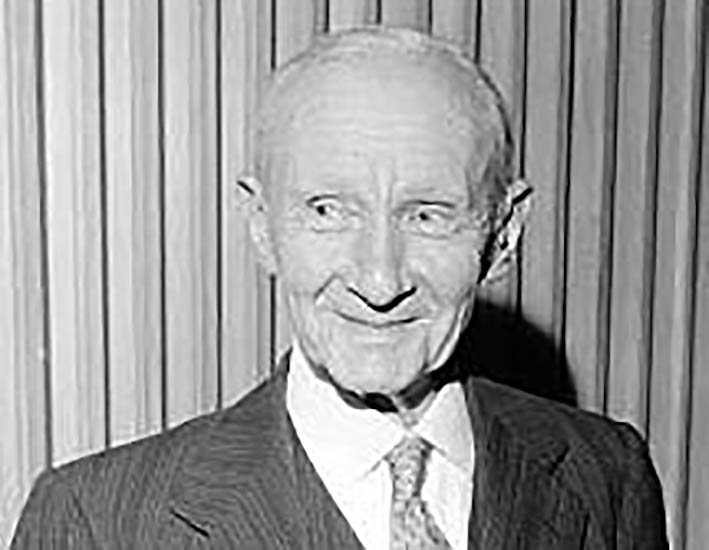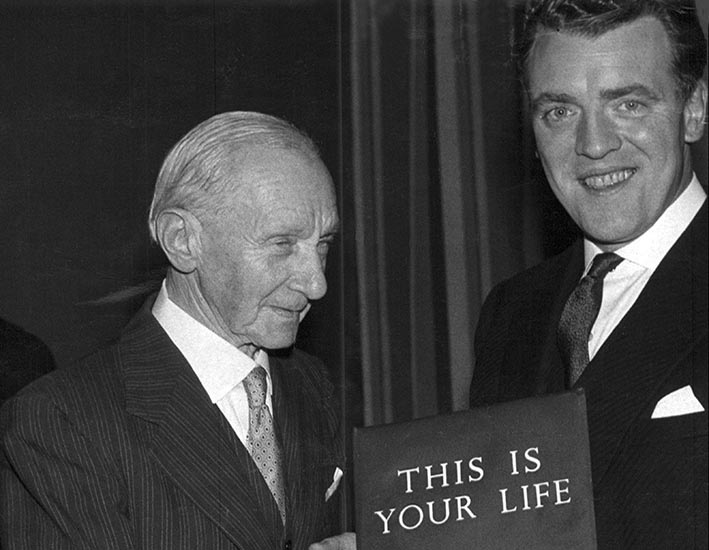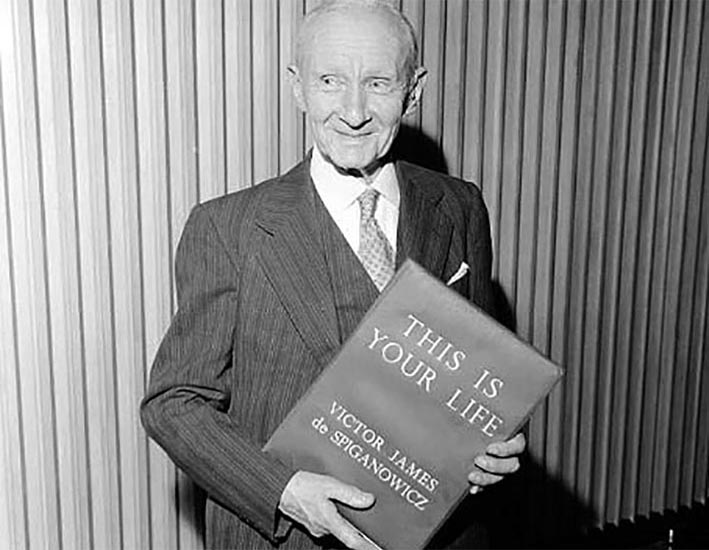Big Red Book
Celebrating television's This Is Your Life
Victor James de SPIGANOVICZ (1881-1970)

THIS IS YOUR LIFE - Victor James de Spiganovicz, writer and humanitarian, was surprised by Eamonn Andrews in the audience at the BBC Television Theatre.
Victor, the son of a Polish nobleman in Odessa, Russia, studied architecture in Edinburgh when his family moved to the UK following his father's death. At the age of 20, he began writing, publishing, and selling his own books to raise funds to set up and maintain a boys' club for the city's underprivileged youths, which led to him establishing the Scout movement in Scotland in 1903.
Among many other business ventures, including building aeroplanes and airships, running a cross-country car repair service, and managing an oxy-acetylene welding workshop, Victor set up a caravan and cyclists' hostel in Berwickshire. All these business ventures made 'Spiggy' - as he was affectionately known - no money due to his generous spirit and the fact that he always had the interest of others at heart.
programme details...
- Edition No: 139
- Subject No: 139
- Broadcast live: Mon 21 Nov 1960
- Broadcast time: 7.30-8.00pm
- Venue: BBC Television Theatre
- Series: 6
- Edition: 10
on the guest list...
- John Morrison
- Colin Frater
- Ivison Macadam
- George Elder
- Tom McLachlan
- Karel Jaeger
- Walter Mercer
- James Allan
- Donald Moir
- Mary Allan
- Brian Hogg
- Tom Moffat
production team...
- Researchers: Ronald Vivian, Liam Nolan
- Writer: Robert Stuart
- Director: Michael Goodwin
- Producer: T Leslie Jackson
the unsung heroes


Photographs of Victor de Spiganovicz This Is Your Life
Victor De Spiganovicz resided in Scotland, was an architect and a friend of Lord Baden-Powell. In addition to being the descendant of the famous Russian general, General Pavel Liprandi, Victor de Spiganovicz is also credited for the founding of the Scouting movement in Scotland. A philanthropist, he donated generously to the British war effort during both World Wars.
Victor James de Spiganovicz was born on October 15, 1881 in Odessa, Russia. He was with the Edinburgh School Board as an architect under Robert Wilson in August 1898. When Wilson died in 1901, Spiganovicz continued as assistant to John Alexander Carfrae, Wilson's successor as School Board architect. De Spiganovicz left Carfrae at the beginning of 1908 and spent several months in America before commencing practice on his own account, presumably in Edinburgh. His office at that date was at 1 South Charlotte Street. He left the architect business at an early age to pursue his other primary passion, writing. He biked through Scotland and wandered the streets of Edinburgh in search of material for his books.
On November 21, 1960, at the age of 79, Victor was guest of honour on the BBC television show This is Your Life. Some of the following events are gleaned from a transcript of the broadcast:
While wandering the streets of Edinburgh, Victor observed the plight of the downtrodden and underprivileged youth. This prompted an interest in starting a boys club for these children. His boys, as he would call them, called him "Spiggy," and he started a youth organization called, "Spiggy's club." The profits from his writing were used to continue his activities with the boys' clubs including the establishing of Causewayside Lad's Institute. His clubs included classes in ambulance work, boxing, wrestling, swimming and football.
A guest on the This Is Your Life programme, Colin Frater, a long-time friend discusses Victor's writing:
"His mind and brain are as keen as an eighteen year old's. And he still goes on writing. He deluges the newspapers with articles, and the BBC with radio scripts and television plays. The fact that they're all rejected never deters him in the least. He says he likes rejection. It makes him write something else and gives him more work."
Victor wrote three booklets on social problems including a 1911 small pamphlet entitled 'Modern Humanity' published by J Bain & Sons, and described by the magazine 'The Scotsman' as a descriptive essay which touches lightly, yet thoughtfully, on the characteristics of the various ages of man, and on the pleasures and riddles of life. In 1924, he wrote an autobiography on his exploits in the First World War and other accounts of his life including his travels and the people he met along the way. In 1925, he published "Hobbies of Three Lunatics." In 1926 he wrote a fictional novel entitled, "The Tousling Bogle" His novels always explored the human psyche using fictional Scottish characters.
From the youth organisations, Victor became interested in the boy scouts, and on the advice of a friend he met while traveling by train, he became an instrumental figure in the boy scouts movement in Edinburgh. In 1912, Victor met Sir Ivison Stevenson Macadam at a scout rally at Fontainbridge, Scotland. The two of them built a swimming pool for the kids by damming up a stream.
At the outbreak of the First World War in 1914, Victor was turned down when he volunteered for active service due to medical reasons. Through sheer determination and perseverance, he persuaded a friendly doctor to pass him with a grade of C, and he was employed in the recruiting-office in Edinburgh. He reached the rank of sergeant and then demoted himself to the rank of private because he wanted to see action. In This Is Your Life George Elder, a fellow soldier was asked, "Was he a good soldier?"
"Aye, he was - in all things but one. He was a terrible shot. After Spig left me, he went on a musketry course. A few days after that, the musketry instructor came up to me and said: 'You know that fellow in your squad with the foreign-sounding name - Spaghetti, or something?' I laughed and said his name was Spiganovicz. The instructor said: 'Well, whatever his name is, he's a bloody awful shot. He's firing that damn rifle all over the Catterick Moors. He may be all right on the square, but what a shot! He couldn't hit an elephant over the arse with a banjo!'"
In October 1914, Victor and Mr. E.G. Currie created the first Scout ambulance. They paid for its conversion and presented it to their local Boy Scouts Association. The vehicle held three stretchers and covered many miles in Scotland. It was one of the first cars to be called out to assist the survivors of the HMS Pathfinder, which was sunk by the enemy in the North Sea during the First World War.
In his autobiographical work "Mystery Man Again," Victor describes how he became interested in converting his car to an ambulance wagon: "As the army would not have me, I offered my services to the Red Cross, and volunteered to drive my own car with assistance from Miss Scott and the late W.B. Potter of Aucrum."
He recounts the event in This Is Your Life: "My own car, a De Dion, became historic as it was the first car in the late war to pick up the survivors of the "Pathfinder," which happened to be the first boat to be sunk in Scottish waters by a German submarine. I happened to be the first to answer the S.O.S. for ambulances and so I was thus privileged".
Prior to the Second World War, Victor rented a large house in Greenlaw, Berwickshire as a hostel for cyclists. James Allen, a friend of 40 years and a one-time member of the scouts, recalls: "He would ask his customers to give him what they could afford - or he would charge nothing at all." The venture ended in 1939 at the outbreak of war - when there were no more customers.
During the Second World War, and because of his architect background, he was given the job of touring hostels belonging to the Scottish Youth Hostels Association and report on their condition. The hostels had fallen in disrepair due to wartime conditions.
Victor spent his later years living in Aberdeen. He died at the age of 86 on June 20, 1970. There was a lapse of a month before his cremation on August 21, 1970 because his body was donated to The Edinburgh Medical School Anatomy Department. His ashes were scattered in the "Garden of Remembrance." Victor never married and had no issue.
Series 6 subjects
Leonard Cheshire | George Bennett | David Sheppard | Sybil Thorndike | Clarence Wolfe | Charles Coward | T E B ClarkeHelene Jeanty-Raven | Cyril Smith | Victor de Spiganovicz | Bill Hartley | Ellen Martha Field | Anthony Deane-Drummond
John Mills | Richard Bancroft | Freddie Mills | William Simpson | Alan Herbert | Madame Vacani | Elizabeth Ambridge | Robert Fawcus
Flora Robson | Edward Chad Varah | James Zarb | Maryan Rawicz and Walter Landauer | James Chipperfield | Anthony Kimmins
Thomas Cosmo Jones | Jessie Matthews | Helen Wilson | Charlie Chester | Brunel Cohen | Godfrey Winn | Billy Wright